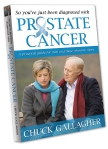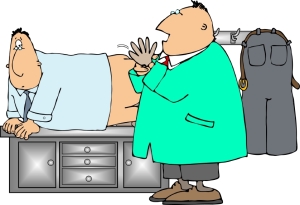Over the course of this past year, as I have been conducting research on Prostate Cancer for my new book, I discovered what might seem obvious to some, but is news to others. Assuming that physically a man can achieve an erection following treatment for prostate cancer (i.e., the nerves were spared) the quality of recovery is, in large part, a function of issues other than physical.
An article written by Leslie R. Schover, Ph.D. states the following:
A narrow focus on erectile rigidity overlooks the role of the partner in successful sexual recovery after prostate cancer. In our survey (MD Anderson), 66% of men noted that their partner had a problem that interfered with sex, most commonly a loss of desire. Not surprisingly, men whose partners enjoyed sex were themselves more satisfied.
As I read those words now I better understand them. After surgery for prostate cancer anticipating  restoration of sexual function, I didn’t quite get it as, like most men, I was preoccupied with an erection and didn’t completely connect the dots.
restoration of sexual function, I didn’t quite get it as, like most men, I was preoccupied with an erection and didn’t completely connect the dots.
In fact before surgery my doctor and I had a frank talk. I recall my surgeon telling me that after a time of healing I would likely achieve an erection (of some sort) and have an orgasm, but that nothing would come out…in other words there would be no ejaculation. I suppose I had a stunned look on my face. He then went on to say that an orgasm occurred in the center part of your brain near your forehead. It was all mental. At the time I thought he was thinking with the wrong “head”…sorry, but I write it as I think it and that was an honest thought.
After surgery (which successfully spared the nerves) I did find that I was able to achieve some sort of an erection and that with some stimulation an orgasm was possible. Sure enough the sensation was in my head…I just had never notices that before. Perhaps I was too preoccupied with the wrong “head.”
For those who have read my former blog entries I will not restate the actions leading to healing. If you have not and are interested click here. Suffice it to say, as time went on I discovered that frustration lead to anxiety and stress – the combination of which meant loss of sexual function.
Toward the end of my eleventh month I had tried many things to return to what I thought should be normal. I did not have an unrealistic sense of what normal was, but I did think that I should be able to engage in sexual activity without having to have performance anxiety.
LADIES: As your man’s partner (I am aware it could be a man as well – I am not concerned with sexual preference here), if you are not aware – performance anxiety is huge for a man. A man’s identity is in large part tied to his sexual function. Not to be crass – that certainly is not my intent – but loss of sexual function for a man is similar to the loss of a woman’s breast. A breast is part of a woman’s identity. Sexual function is a part of a man’s and critically important when dealing with the emotional healing that must take place from cancer recovery.
BACK TO ELEVEN MONTHS…at that time I elected to have a hypnotherapy session. While that was not normal for me, I was aware that the subconscious mind is powerful. My negative self talk – “I can’t sexually perform,” “Wonder how my wife thinks about all this,” “Wonder if she’ll be patient,” “Am I still attractive,” “How can I be attractive if I can’t perform in bed,” – and the talk went on and on. I felt that anything was worth a shot.
SPEAKING OF SHOTS: Yes, I did attempt the injection into the penis therapy. For me it did not work. I am deathly afraid of needles and soon after the doctor did the injection – directing me to “go and enjoy a fabulous erection” – I nearly passed out. Seems that the psychological block to needles was much stronger than the medicine administered. Conclusion – I was not a candidate for that treatment.
HYPNOTHERAPY: In my case, hypnotherapy worked. It did not change me physically in any way, rather, it was effective in tapping into my subconscious mind allowing the mental blocks I had placed to be removed. That was huge. After the session, I walked away with a CD that I listened to each night as I fell asleep. Within two weeks I was amazed at the normality of my sexual responsiveness. Somehow I felt less anxiety.
Side note: I have contacted the Hypnotherapist that I used (as there are few who work in this arena) to see if she might offer a generic CD for men who have undergone Prostate Cancer surgery (with the nerve sparing technique utilized). If you are interested…please contact me at chuck@chuckgallagher.com.
ANOTHER DISCOVERY: While I certainly cannot speak for all men, I have found through my research that a more satisfying sexual relationship can be had if you go back to how your started. Let me explain. For most of us, when we were young men we flirted, we strutted, we did everything we could think of to attract that woman or girl to (first) go out with us, and (then) perhaps to make love to us. Rarely, did we look at the female – say, “want to have sex,” and then get it on. In fact, had we done that we would likely have been slapped.
Hum…well, after years of marriage the question is – how many of us put that same amount of effort into the relationship? Since I have elected for my life to be a bit of an open book…I’ll be completely candid here. Sex had become less passionate, less playful and more a function, and if that is the way I saw it, I’m sure it was much less fulfilling for my wife. Needless to say, there is no wonder that it was difficult to move through sexual healing following surgery.
TWO THINGS I FOUND: (1) Physically it took more time, effort and stimulation in order to achieve a satisfying sexual experience; and (2) that was easier achieved if I were relaxed and did not feel stress to perform.
The first issue was something that I had to discuss (not easy) with my spouse. Men rarely tell women what works, they (we guys) are too macho. Now, I never considered myself macho, but I did find it difficult to truly be willing to open up and tell my wife exactly what I needed from her to make sex satisfying. Regarding # 2, I did find the hypnotherapy effective. Exactly how it worked, I can’t say, but the effect was profound. The way I looked at it was it cost me the equivalent of 10 Viagra pills and could potentially have a long lasting benefit. When I put it into perspective, it was worth a try and a heck of a lot more comfortable than a shot to the penis.
CONCLUSION: Dr. Schover is right – successful sexual activity following prostate cancer treatment is not just physical. It is a joint venture – yours and your partner’s. Over the span of three and one-half years, we have come to understand the joys of a mutually satisfying relationship while understanding that I am not 17 and have undergone life altering surgery in order to live. As I talked with many in the course of my book research…I have come to know that those who have reported the best results are those who also have a willing, resourceful and patient partner whose love speeds along health.
AS ALWAYS…YOUR COMMENTS ARE WELCOME.
Read the rest of this entry »
 for the book. The questionnaire was thorough and exposed me to several sites that I had not seen before. As most who read this blog know, ranking on google, is a function of a multitude of things, not the least of which is search engine optimization, keywords, etc. Therefore, some of the sites are a bit obscure but relevant nonetheless.
for the book. The questionnaire was thorough and exposed me to several sites that I had not seen before. As most who read this blog know, ranking on google, is a function of a multitude of things, not the least of which is search engine optimization, keywords, etc. Therefore, some of the sites are a bit obscure but relevant nonetheless.


 Posted by chuckgallagher
Posted by chuckgallagher 









